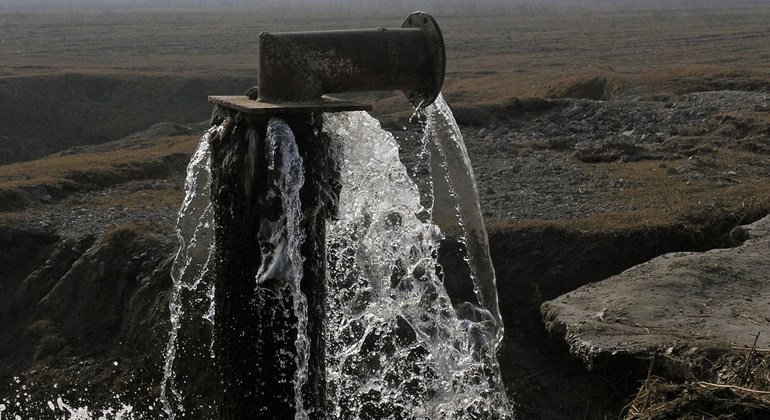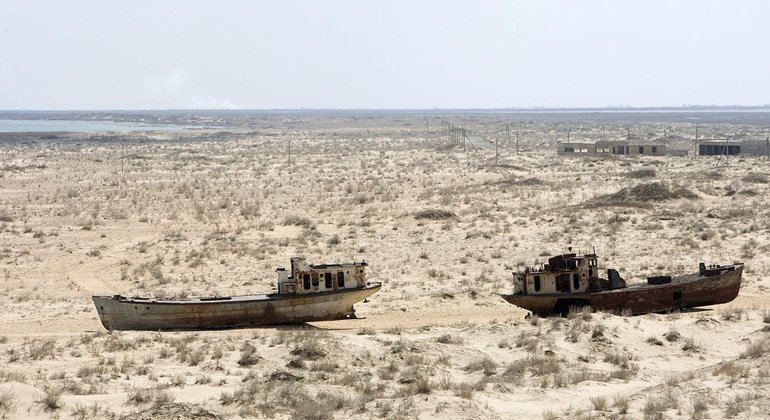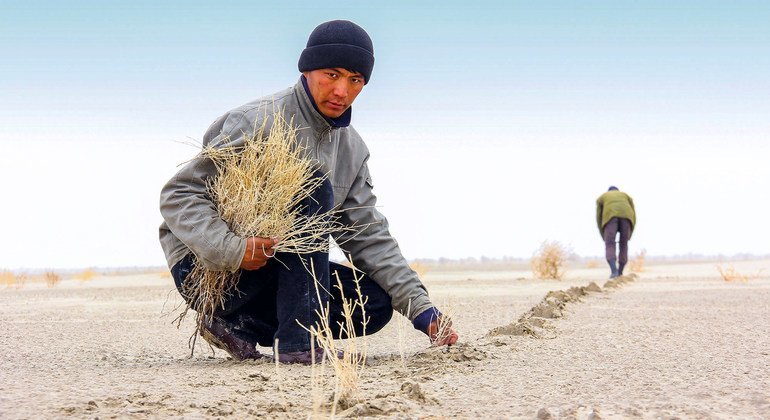
About 70 percent of the territory of Uzbekistan is located in the arid climate zone. The state of the environment in Uzbekistan: the reduction of glaciers aggravates the shortage of water resources Climate and Environment
At the 14th meeting of the Conference of the Parties to the Convention on the Conservation of Migratory Species of Wild Animals, which was held in Samarkand in February, Uzbekistan presented its National Report on the State of the Environment.
This document provides an overview of the current environmental situation, trends, government priorities and strategies, and progress towards meeting the Republic’s obligations under environmental agreements. The study was prepared by Uzbek experts with the support of the United Nations Economic Commission for Europe (ECE), the United Nations Environment Program (UNEP) and the Food and Agriculture Organization of the United Nations (FAO).
Water scarcity
One of the key problems in Uzbekistan, according to the report, is the worsening water shortage. As experts note, on the one hand, this situation is associated with population growth and increasing needs for food and energy.
On the other hand, this is a consequence of climate change. For example, in the mountains the volume of snow and glaciers is decreasing. The report states that over the past 50-60 years, the size of glaciers in the Pskem River basin has decreased by 24 percent, the Surkhandarya River by 40 percent, and the Kashkadarya River by 70 percent.

Researchers report that in the coming decades, the flow of the Amu Darya and Syr Darya rivers could decrease by 5-15 percent, leading to further worsening of water scarcity. To preserve water resources in Uzbekistan, state programs are being implemented that involve payments and fines for pollution and excess use.
Aral Sea
As the authors of the report note, the condition of the Aral Sea worsened in the second half of the last century due to water withdrawal for irrigation and a reduction in the flow of the Amu Darya and Syr Darya, which feed this reservoir. Compared to 1960, the volume of the Aral Sea has decreased by 16 times.
Water pollution and dust-salt storms from the bottom of the dried-up Aral Sea lead to an increased incidence of anemia, gastrointestinal, cardiovascular and other disorders, experts emphasize.
In addition, the yield in the Aral Sea region is 2–3 times less than normal, and the decline in productivity of pastures and lands, the death of tugai vegetation and the drying out of lakes are estimated to have led to the loss 100 thousand jobs in the region.

Air pollution
Among the main factors behind air pollution, another key problem in Uzbekistan, the report’s authors point to the growing number of cars, outdated fuel standards, as well as the use of coal and wood for heating and insufficient use of clean technologies. There are 4 million cars in Uzbekistan that emit 1.3 million tons of harmful substances per year, the most in Tashkent and the Tashkent region. At the same time, the import and use of electric vehicles is increasing in the country, the report emphasizes.
Currently, among the Central Asian states, only Kazakhstan is a party to the UNECE Air Quality Convention, but all countries in the region can participate in the program to develop competence in this area. If they accede to the Convention, they will have the opportunity to receive further support for the implementation of specific projects.
Read also:
Uzbekistan first in Central Asia joined the UN Protocol on Water and Health
UNECE Regional Adviser Sarangu Radnaaragchaa said the Commission is supporting the government of Uzbekistan in conducting an “inventory” on air quality and emissions projections. According to her, the UNECE develops its programs and recommendations based on information that comes from countries, so for effective work it is necessary to increase the capacity of local specialists in the field of data analysis and modeling. With the technical support of the Commission, as part of the preparation of the report, experts from Uzbekistan became familiar with modern methodology for assessing environmental problems and the impact of various factors on it, and now they will be able to use these skills in their future work, Radnaaragchaa reported.
Dust storms and desertification
In addition to human activity, air quality is affected by natural factors such as dust storms. According to the report, about 70 percent of Uzbekistan’s territory is in an arid climate with widespread desert soils and sands subject to frequent dust storms and dry winds. At the same time, human activity – primarily overgrazing – can negatively affect the condition of soils and lead to further desertification.

The authors of the study note that too intensive livestock farming leads not only to the degradation of soils and pastures, but also to the deterioration of forests, the disappearance of rare plants and the reduction of habitats for wild animals.
At the same time, according to the report, aquatic ecosystems experience the strongest impact of human activity. Thus, at present, tugai forests occupy only 10 percent of the original area of this vegetation in the Amu Darya delta.
Participation of local communities
According to the UNECE representative, Uzbekistan is currently in the process of acceding to the Aarhus Convention on Access to Information, Public Participation in Decision-Making and Access to Justice in Environmental Matters. The publication of data means that Uzbekistan is already fulfilling the requirements of the convention, the Regional Adviser noted.
The expert emphasized that broad participation of the population is important in solving environmental problems, therefore, to prepare reports or conduct events Representatives of civil society or local communities are invited. According to her, representatives of non-governmental organizations of Uzbekistan positively assessed the publication of environmental data in a format accessible to the general public, and also reported that they were interested in joint efforts and participation in further events.
In addition, Radnaaragchaa noted that, following the example of Uzbekistan, the government of Turkmenistan sent a request to the UNECE for assistance in preparing a similar study on the state of the environment.
